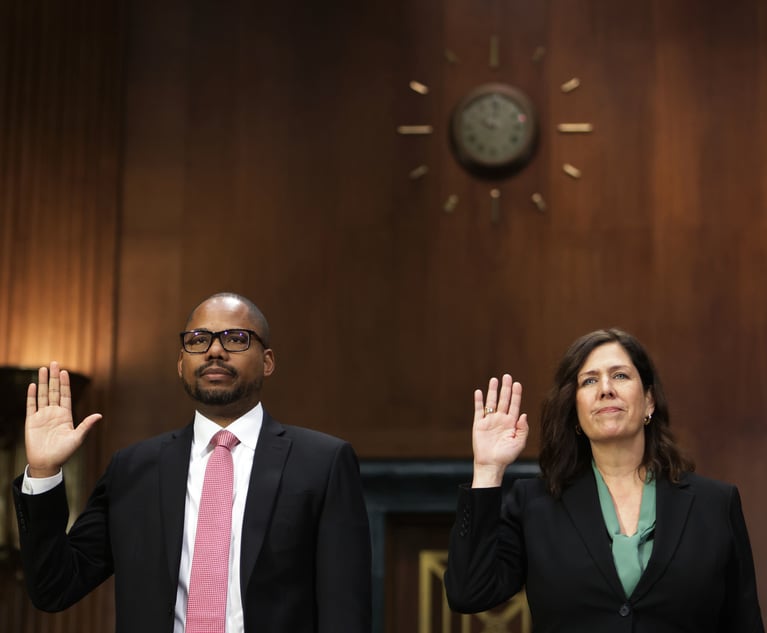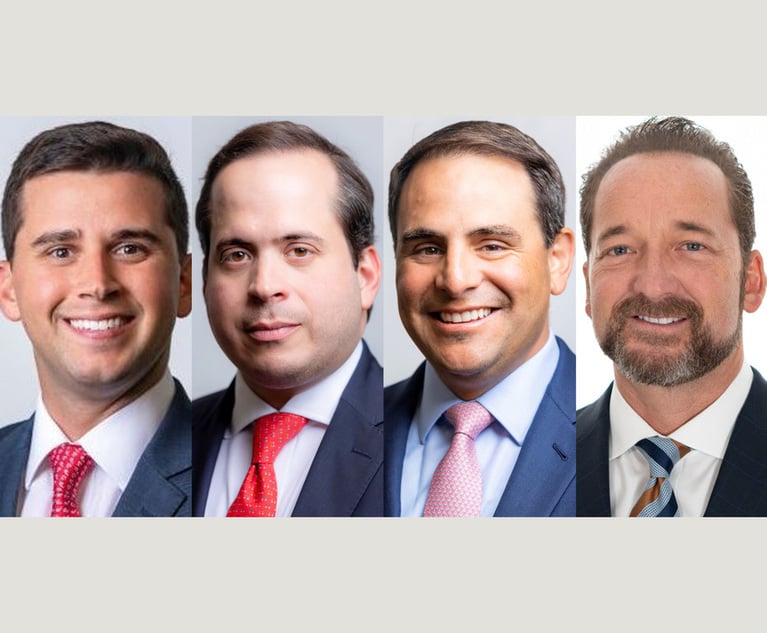 Melissa Roque (left) and Shubhra Mashelkar, Weinberg Wheeler Hudgins Gunn & Dial, Atlanta. (Courtesy photos)
Melissa Roque (left) and Shubhra Mashelkar, Weinberg Wheeler Hudgins Gunn & Dial, Atlanta. (Courtesy photos)Vaporizing Liability: Strategies for Electronic Cigarette and Vape Companies
Given the precarious nature of the issues surrounding e-cigarette use, companies must consider strategic options to thwart continued problems and minimize risk.
November 25, 2019 at 12:11 PM
6 minute read
As of Nov. 5, the national Centers for Disease Control and Prevention reported 2,051 e-cigarette-related, or "vaping," injuries and 39 deaths, including three in Georgia. E-cigarettes vary widely in design, but all contain the same main components: a battery; a cartridge, which stores the e-liquid; an atomizer, which heats the e-liquid into a vapor; and the mouthpiece. The cartridge may contain flavoring, nicotine, THC, CBD or some combination thereof.
Referred to by the CDC as e-cigarette-or-vaping product use associated lung injury, or EVALI, the CDC is working with both the Food and Drug Administration and the Drug Enforcement Administration to determine the sources of these injuries and remove them from circulation. EVALI's cause is suspected to be a chemical exposure; however, the responsible product, brand or specific substance has not yet been identified. The CDC has named vitamin E acetate as a potential toxin of concern, and there is increasing evidence that the majority of vaping-related injuries and deaths stem from black market or counterfeit products.
FDA first took steps to regulate e-cigarette and vaping products in 2016, when it promulgated a "deeming rule" requiring e-cigarettes and vaping devices to be subject to premarket approval. However, the agency later said it was delaying the provision requiring manufacturers to submit applications for products on the market with a 2022 deadline. In July, a federal judge moved the 2022 deadline to May 12, 2020, for manufacturers to submit a premarket tobacco application for approval. E-cigarette and vape products that fail to win FDA approval will be barred from the market.
Given the precarious nature of the issues surrounding e-cigarette use—including an ever-changing political and regulatory landscape as well as a rapid increase in the number of lawsuits being filed against manufacturers and sellers of e-cigarette and vaping products—companies must consider strategic options to thwart continued problems and minimize risk.
Lawsuits are Varied and Numerous
Across the United States, individual lawsuits and class action lawsuits are being filed at a rapid rate. Many of these lawsuits target Juul Labs Inc., a popular e-cigarette company, and center around the marketing tactics allegedly used to addict people to nicotine. Other lawsuits allege severe personal injury and even wrongful death.
In July 2019, a lawsuit was filed on behalf of Maxwell Berger, a 22-year-old who suffered a hemorrhagic stroke after allegedly becoming addicted to Juul's products (Berger v. Juul Labs, Inc., et al, CGC-19-577444). The lawsuit makes multiple claims, including strict product liability and negligence, and represents the first attempt to hold an e-cigarette maker liable for severe personal injury.
In October 2019, what is believed to be the first wrongful death lawsuit against Juul was filed (Vail v. Juul Labs, Inc., N.D. Cal., No. 3:19-cv-06597). The complaint, which also contained causes of action for strict product liability and negligence, alleges that Juul e-cigarettes and nicotine cartridges were a significant factor in causing the respiratory injury and death of Daniel Wakefield. The complaint alleges that Juul's e-cigarette was defective in design because, among other things, it delivered chemicals harmful to users' airway, throat and lungs. The complaint further alleges that Juul failed to warn of the risks associated with vaping. The complaint also alleges that Juul failed to include instructions regarding product usage, such as how many nicotine cartridges are safe to use in one day.
With the uncertainty surrounding vaping-related injuries, it is important for e-cigarette companies to take necessary steps to avoid becoming part of the onslaught of product liability litigation that is sure to come.
Guarding Against Product Misuse and Misidentification
Many consumers use cartridges purchased from illegitimate sellers or which are modified from their original form. This is especially prevalent with respect to marijuana cartridges. Data indicates that THC-containing products are linked to most cases of EVALI. Specifically, 76% of the people with lung injuries reported using THC-containing products.
Although THC cannot be legally sold in Georgia for recreational use, manufacturers still must be wary of product misuse. Consequently, companies selling e-cigarettes or vapes—even companies that do not sell THC-based cartridges—can help protect themselves from liability by using adequate warnings. Specific instructions and warnings that only certain approved cartridges may be used with the product, and that using non-approved cartridges could result in serious injury or death, may be added. Further, products should contain disclaimers related to their alteration, remaining mindful of the fact that potential plaintiffs may claim that alteration of the product was foreseeable. Additionally, manufacturers should adequately warn consumers about all known risks associated with the use of their products.
Using informational campaigns and advertising to distinguish their authentic products from knock-offs is another step manufacturers can take to reduce their potential liability. For example, Heavy Hitters, a cannabis vape cartridge producer, uses its website to discuss product authenticity and how to report counterfeit cartridges. The company also hired a former federal prosecutor, Priya Sopori, to assist in developing measures to reduce or eliminate counterfeiting.
It is also beneficial for companies to create updated or new packaging. Loudpack, the holding company for Kingpen—a popular cannabis vape company—invests millions of dollars in redesigning its packaging and product security. Kingpen products now include a six-digit alphanumeric serial number concealed beneath a scratch-off panel, which can be checked on the company's website for authenticity.
To date, vaping-related lawsuits have targeted a wide spectrum of companies, from midscale CBD oil manufacturers to the largest e-cigarette brands. No group is immune. There are concerns that reputable producers of vaping products could be unfairly targeted in the litigation onslaught, as products may be falsely equated with illicit vaping oils from the black market. While it is unknown if the cost of litigation and a new FDA regulatory scheme could reshape the vaping industry, this much is certain: until all the causes behind EVALI are identified, both companies and consumers must remain vigilant to protect themselves.
Shubhra Mashelkar is a partner in the Atlanta office of Weinberg Wheeler Hudgins Gunn & Dial. Her practice focuses on civil litigation with emphasis on product liability, environmental and toxic tort, professional liability and catastrophic injury.
Melissa E. Roque is an associate in the Atlanta office of Weinberg Wheeler Hudgins Gunn & Dial, where she represents clients in civil litigation, including catastrophic injury and product liability litigation.
This content has been archived. It is available through our partners, LexisNexis® and Bloomberg Law.
To view this content, please continue to their sites.
Not a Lexis Subscriber?
Subscribe Now
Not a Bloomberg Law Subscriber?
Subscribe Now
NOT FOR REPRINT
© 2024 ALM Global, LLC, All Rights Reserved. Request academic re-use from www.copyright.com. All other uses, submit a request to [email protected]. For more information visit Asset & Logo Licensing.
You Might Like
View All
Trump's Solicitor General Expected to 'Flip' Prelogar's Positions at Supreme Court

'Radical Left Judges'?: Trump Demands GOP Unity Against Biden's Judicial Picks
4 minute read
Trump's Lawyers Speak Out: 'The President Had the Confidence to Retain Me'

Law Firms Mentioned
Trending Stories
- 1Stock Trading App Robinhood Hit With Privacy Class Action 1 Month After Alleged Data Breach
- 2NY High Court Returns Fired Priest's Discrimination Claim to State Agency
- 3Digging Deep to Mitigate Risk in Lithium Mine Venture Wins GM Legal Department of the Year Award
- 4Reminder: Court Rules and Statutes Apply to Pendente Lite Custody Decisions
- 5Consumer Cleared to Proceed With Claims Against CVS 'Non-Drowsy' Medication, Judge Says
Who Got The Work
Michael G. Bongiorno, Andrew Scott Dulberg and Elizabeth E. Driscoll from Wilmer Cutler Pickering Hale and Dorr have stepped in to represent Symbotic Inc., an A.I.-enabled technology platform that focuses on increasing supply chain efficiency, and other defendants in a pending shareholder derivative lawsuit. The case, filed Oct. 2 in Massachusetts District Court by the Brown Law Firm on behalf of Stephen Austen, accuses certain officers and directors of misleading investors in regard to Symbotic's potential for margin growth by failing to disclose that the company was not equipped to timely deploy its systems or manage expenses through project delays. The case, assigned to U.S. District Judge Nathaniel M. Gorton, is 1:24-cv-12522, Austen v. Cohen et al.
Who Got The Work
Edmund Polubinski and Marie Killmond of Davis Polk & Wardwell have entered appearances for data platform software development company MongoDB and other defendants in a pending shareholder derivative lawsuit. The action, filed Oct. 7 in New York Southern District Court by the Brown Law Firm, accuses the company's directors and/or officers of falsely expressing confidence in the company’s restructuring of its sales incentive plan and downplaying the severity of decreases in its upfront commitments. The case is 1:24-cv-07594, Roy v. Ittycheria et al.
Who Got The Work
Amy O. Bruchs and Kurt F. Ellison of Michael Best & Friedrich have entered appearances for Epic Systems Corp. in a pending employment discrimination lawsuit. The suit was filed Sept. 7 in Wisconsin Western District Court by Levine Eisberner LLC and Siri & Glimstad on behalf of a project manager who claims that he was wrongfully terminated after applying for a religious exemption to the defendant's COVID-19 vaccine mandate. The case, assigned to U.S. Magistrate Judge Anita Marie Boor, is 3:24-cv-00630, Secker, Nathan v. Epic Systems Corporation.
Who Got The Work
David X. Sullivan, Thomas J. Finn and Gregory A. Hall from McCarter & English have entered appearances for Sunrun Installation Services in a pending civil rights lawsuit. The complaint was filed Sept. 4 in Connecticut District Court by attorney Robert M. Berke on behalf of former employee George Edward Steins, who was arrested and charged with employing an unregistered home improvement salesperson. The complaint alleges that had Sunrun informed the Connecticut Department of Consumer Protection that the plaintiff's employment had ended in 2017 and that he no longer held Sunrun's home improvement contractor license, he would not have been hit with charges, which were dismissed in May 2024. The case, assigned to U.S. District Judge Jeffrey A. Meyer, is 3:24-cv-01423, Steins v. Sunrun, Inc. et al.
Who Got The Work
Greenberg Traurig shareholder Joshua L. Raskin has entered an appearance for boohoo.com UK Ltd. in a pending patent infringement lawsuit. The suit, filed Sept. 3 in Texas Eastern District Court by Rozier Hardt McDonough on behalf of Alto Dynamics, asserts five patents related to an online shopping platform. The case, assigned to U.S. District Judge Rodney Gilstrap, is 2:24-cv-00719, Alto Dynamics, LLC v. boohoo.com UK Limited.
Featured Firms
Law Offices of Gary Martin Hays & Associates, P.C.
(470) 294-1674
Law Offices of Mark E. Salomone
(857) 444-6468
Smith & Hassler
(713) 739-1250






